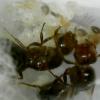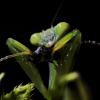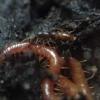Just wait probably by next year you'll wish they were too scared to venture out
.
When I first got into ant-keeping in late July, I was outrageously enthusiastic about the whole endeavor. I simply hadn't realized yet just how much patience this hobby requires. Just take a look at the process: When you first catch queens, they're supposed to remain dark and undisturbed for several boring weeks. Then, when you can finally peek at them, they boringly sit by their boring brood for a few boring months. Then, when the first nanitics appear, they're all utterly terrified of leaving the nest for months. Now, I'm preparing my boring colonies for an even more boring hibernation. Totally anti-climactic! I just wanna fast forward to the point where I have an enormous colony that can sting an attacking bear to death or devour an entire deer carcass in mere minutes! ![]()























